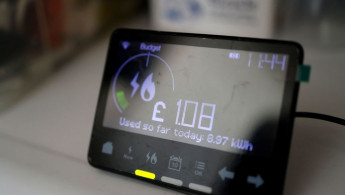UK opposition Labour Party wants parliament recalled over energy price cap
Britain's opposition Labour Party said parliament should be recalled on Monday to freeze energy bills for the winter as the country deals with the worst cost-of-living crisis in decades.
The demand to outgoing Prime Minister Boris Johnson and the two Conservative Party candidates vying to replace him coincides with the next expected energy price cap rise on Friday when parliament is in recess for the summer.
Johnson has faced criticism from within and outside his party that he is in charge of a directionless government that is unwilling to help the public with soaring energy bills.
Charities in Britain are warning that millions of people could be forced into poverty if the government does not come up with a new support package.
"Across Britain, people are having to make unthinkable choices about how to pay their bills, causing endless worry for households and businesses," said Thangam Debbonaire, Labour's shadow leader of the House of Commons.
"Families deserve a government that is on their side, and is ready to take the action needed now to meet the scale of this national emergency."
After being forced to resign by members of parliament in his own party last month, Johnson has taken two holidays, including a long-delayed honeymoon.
Johnson is due to leave office early next month after the Conservatives announce the winner of a contest between the foreign minister Liz Truss and former finance minister Rishi Sunak.
Labour has called for the energy price cap to be frozen to help people deal with another surge in fuel bills. Forecasting group Cornwall Insight estimates that average British annual bills for gas and electricity will jump to 3,582 pounds in October and 4,266 pounds in January.
Labour Party, if in power, said it would cap energy costs at the current level of 1,971 pounds ($2,386) per year for six months from October and would pay for it by extending a windfall tax on oil and gas companies.
A government spokesperson said any major spending decisions will be for the next prime minister and it has already offered a 37-billion-pound package of help.





 Follow the Middle East's top stories in English at The New Arab on Google News
Follow the Middle East's top stories in English at The New Arab on Google News


